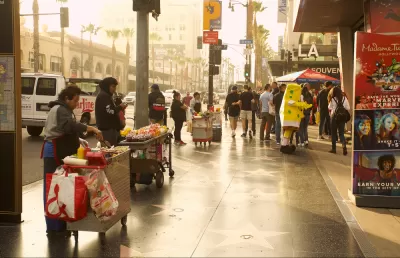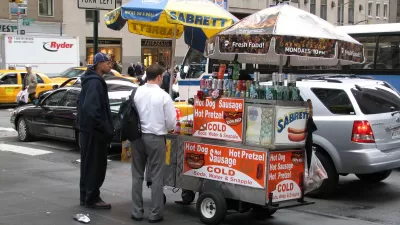With new regulations poised to add 400 new vendors to New York City's streets every year for the next decade, city leaders can look to L.A.'s recent legalization efforts for guidance.

As New York City gets ready to permit hundreds of new street vendors, Alissa Walker suggests some lessons the city can take from Los Angeles. "New York City, where antiquated street vending policies have created a competitive black market for permits, is poised to see a dramatic expansion of its street vendor system for the first time in four decades. Intro 1116, passed earlier this year, adds 400 new permits per year for a decade starting in 2022."
In Los Angeles, the "city council has had an ordinance decriminalizing vendors, backed up by a state law, the Safe Sidewalk Vending Act, passed in 2019. The city’s official permitting process began in January 2020 at a discounted rate of $291; later in the year, the city council made $6 million in grants available to help vendors pay for paperwork and equipment." But many L.A. vendors are trapped in a paradox: in order to pass inspection, vendors are required to have expensive cart setups that many of them can't afford, on top of permitting fees.
Community activists are working to find solutions. "Creating dedicated food hubs could help bring together vendors and mutual-aid groups to become a gathering place where neighborhoods could tackle food insecurity, says Todd Cunningham, the food and wellness organizer at Los Angeles Community Action Network, which is trying to improvise on that model when it serves community meals on Skid Row multiple times per week." Another organizer, "Carla De Paz, senior organizer at Community Power Collective, is working with the city on developing a 'special vending district' permit, that’s somewhere between a special event permit and a farmers market permit, she says."
Despite New York City Mayor de Blasio's promises to support street vendors, "[n]ot only are vendors still getting ticketed, some neighborhood groups, including alliances and BIDs, have found new ways to discourage vendors from selling on their streets, as a recent throwdown at Hudson Yards demonstrated." To succeed, the new permit system should also address "[c]ode compliance, changing laws at the state level, better relationships with regulators," and, critically, support for infrastructure such as communal prep kitchens, or commissaries, which help street vendors meet permit requirements and reduce costs.
FULL STORY: New York City Is About to Add 4,000 Street Vendors. Los Angeles Has Some Ideas to Borrow.

Maui's Vacation Rental Debate Turns Ugly
Verbal attacks, misinformation campaigns and fistfights plague a high-stakes debate to convert thousands of vacation rentals into long-term housing.

Planetizen Federal Action Tracker
A weekly monitor of how Trump’s orders and actions are impacting planners and planning in America.

San Francisco Suspends Traffic Calming Amidst Record Deaths
Citing “a challenging fiscal landscape,” the city will cease the program on the heels of 42 traffic deaths, including 24 pedestrians.

Half of Post-Fire Altadena Home Sales Were to Corporations
Large investors are quietly buying up dozens of properties in Altadena, California, where a devastating wildfire destroyed more than 6,000 homes in January.

Opinion: What San Francisco’s Proposed ‘Family Zoning’ Could Really Mean
Mayor Lurie is using ‘family zoning’ to encourage denser development and upzoning — but could the concept actually foster community and more human-scale public spaces?

Jacksonville Launches First Autonomous Transit Shuttle in US
A fleet of 14 fully autonomous vehicles will serve a 3.5-mile downtown Jacksonville route with 12 stops.
Urban Design for Planners 1: Software Tools
This six-course series explores essential urban design concepts using open source software and equips planners with the tools they need to participate fully in the urban design process.
Planning for Universal Design
Learn the tools for implementing Universal Design in planning regulations.
Gallatin County Department of Planning & Community Development
Heyer Gruel & Associates PA
JM Goldson LLC
City of Camden Redevelopment Agency
City of Astoria
Transportation Research & Education Center (TREC) at Portland State University
Jefferson Parish Government
Camden Redevelopment Agency
City of Claremont





























